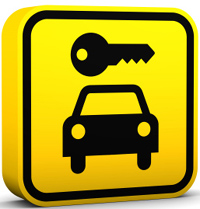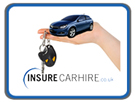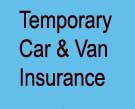|
|
|



advice
on Car hire
(or Van / Motorhome )...
Please
note this information should not be relied on
for accuracy as rules are constantly being updated
 Before you leave home -
Ensure
that you are carrying both your picture and paper
driving licence
(the paper licence shows any endorsements you may
have)
and your passport (if visiting another country) and
travel tickets and car hire paperwork.
Before you leave home -
Ensure
that you are carrying both your picture and paper
driving licence
(the paper licence shows any endorsements you may
have)
and your passport (if visiting another country) and
travel tickets and car hire paperwork.
When
you collect the car:
Although
it might be dark and raining.....
- Check
the vehicle for damage
- Check
the spare tyre

REMEMBER:
 Most car rental locations require a
credit card
Most car rental locations require a
credit card
Most
car rental locations will not accept debit
or Switch, Maestro cards or similar they must be
a credit card. It is worth checking in advance
if they accept American Express or Diners Club
You
must have held a valid driving licence for one year
 UK licence holders should note that from June 8,
2015 Paper counter part licences will no longer
be valid so they might need updated info from the
DVLC
More
Here
UK licence holders should note that from June 8,
2015 Paper counter part licences will no longer
be valid so they might need updated info from the
DVLC
More
Here
Some
car rental companies insist that you have held a
full driving licence for one year and also must
be over 25. Check in advance as it could mean when
you reach the car hire desk, they will not let you
rent a car.
Some companies (or legislation
in a particular country) will not let a driver
hire a car over a certain age -
More information Here for "older drivers"
International
Driving Permits (IDP) This
was established by the 1949 Geneva Convention -
Some countries insist the driver has one if you
are driving in countries outside the European Union
(EU) or European Economic Area (EEA). It will be
written in ten languages. The IPD will be required
in Argentina, Brazil, Burkina Faso,Burundi, Egypt,
Ethiopia, Greece, Iraq Japan, Kenya, Kuwait, Senegal,
Somalia and South Africa. It
is advisable to check with the car hire company
when you make your booking.
Always
ask what is included in the rates quoted
 Never initial or sign an agreement without asking
about each item
Never initial or sign an agreement without asking
about each item
 Do
not over insure. If you have travel insurance you
do not need personal effects or personal accident
insurance Do
not over insure. If you have travel insurance you
do not need personal effects or personal accident
insurance
Pre-purchase
or Pre-reserve your car rental
Remember
to book child seats or a roof rack in advance, particularrly
in peak holiday times,
it can be a lot cheaper to actually
bring your own child seats, even taking into account
costs from airlines.
Plan
the journey in advance - Some car rental companies
provide maps, some will rent you a sat-nav system
Purchase
from agents within your own country in case you need
refunds or assistance
When
you pick-up your vehicle determine where the drop
off point is for your return
Ask
if the return area has an attendant. If not, who
do you return the car to?
If
you leave the vehicle without check-in, examine
it for damage and photograph it from every angle.
 - The
Vehicle Condition Report (VCR) - Check your
vehicle carefully for signs of damage before driving
away. This can be difficult some times if you are
in a hurry, it is dark, it is raining, or very very
hot and you are in a hurry and have been waiting for
the car to be prepared and if it has just been washed
and is not dry- however it is very important.
- The
Vehicle Condition Report (VCR) - Check your
vehicle carefully for signs of damage before driving
away. This can be difficult some times if you are
in a hurry, it is dark, it is raining, or very very
hot and you are in a hurry and have been waiting for
the car to be prepared and if it has just been washed
and is not dry- however it is very important. If they have identified certain areas of damage on
the plan of the car and not all of them, return to
the hire desk and get the additional damage signed
off.
If they have identified certain areas of damage on
the plan of the car and not all of them, return to
the hire desk and get the additional damage signed
off.Take
photos of any damaged areas when you collect the car/van/campervan.
Sometimes these are very small. This of course is
difficult to do in bad weather conditions or at night.
Examples of damage to look out for below:-
 Left:
Small scratches on door handle
and dent on edge of door Left:
Small scratches on door handle
and dent on edge of door
Right: Scratches and blemishes
on paintwork  Left: Bad scatch
on door
Left: Bad scatch
on door
Right:
Black scratches above tyre

 Left:
Damage to rental van found
on collection Left:
Damage to rental van found
on collection
Right:
Missing section of bumper on
rental van 
 The
above two illustration of damage on a rental van have
been entered on the collection report
for this van hire from a major UK van hire company.
It is very important to check the vehicle at collection
as you might often find with vans the vehicle is parked
close to another rental van and there is not a great
deal of room to inspect the vehicle
The
above two illustration of damage on a rental van have
been entered on the collection report
for this van hire from a major UK van hire company.
It is very important to check the vehicle at collection
as you might often find with vans the vehicle is parked
close to another rental van and there is not a great
deal of room to inspect the vehicle Left
car hire report at Dublin Airport - May 2015
- On
collection the people hiring were told there was a
scratch on the right hand wing. Before removing the
car from the hire company's premises a further check
was carried out by the customers.
Left
car hire report at Dublin Airport - May 2015
- On
collection the people hiring were told there was a
scratch on the right hand wing. Before removing the
car from the hire company's premises a further check
was carried out by the customers.
 This
check quickly found the absence of the near side
front hub cap and another scratch at the rear. The
Damage report form was then taken back into the
office for signature.
This
check quickly found the absence of the near side
front hub cap and another scratch at the rear. The
Damage report form was then taken back into the
office for signature.
 What
was not discovered then was a mark below the boot
catch on this Renault Clio. So you really need to
check everything and of course if it is wet and
dark the job is even harder.
What
was not discovered then was a mark below the boot
catch on this Renault Clio. So you really need to
check everything and of course if it is wet and
dark the job is even harder.
 Check the rental agreement: The rental agreement
will normally include a section for the hire company
to record the damage that has been identified. Let
the car hire company know if damage has not been
recorded before you drive away, even if you are
anxious to get going. If you have identified damage
let them know.
Check the rental agreement: The rental agreement
will normally include a section for the hire company
to record the damage that has been identified. Let
the car hire company know if damage has not been
recorded before you drive away, even if you are
anxious to get going. If you have identified damage
let them know.
Guardian
Money 20 July 2024
- Remember your phone is a free alternative to a
satnav - through apps such as Google Maps and Waze.
Car
seats can be taken on a flight for free so there
is usually no need to rent one at your destination,
if you are prepared to lug yours through the airport.
 Drink drive laws vary from country to country -
for example in Italy if you have a glass of wine
and a grappa with dinner and you are stopped by
the police - you will be fined. See
also Drink Drive Laws - Examples of what can be
drunk at present
Drink drive laws vary from country to country -
for example in Italy if you have a glass of wine
and a grappa with dinner and you are stopped by
the police - you will be fined. See
also Drink Drive Laws - Examples of what can be
drunk at present
 Know your speed limits -
these vary from country to country.
Know your speed limits -
these vary from country to country.
 Speed / Radar cameras certainly apply to rental
cars as well! The rental company will be notified
and the renter contacted by the authorities. Speed
traffic camera information is now being sent from
one country to another. e.g. someone caught speeding
with a French registered car in Italy will find
that the fine will be reported to the French authorities
if it is not paid.
Speed / Radar cameras certainly apply to rental
cars as well! The rental company will be notified
and the renter contacted by the authorities. Speed
traffic camera information is now being sent from
one country to another. e.g. someone caught speeding
with a French registered car in Italy will find
that the fine will be reported to the French authorities
if it is not paid.
Fuel
in the car  You should check that there
is a full tank of fuel (Petrol / Diesel) and normally
you should return it full. Car hire companies will
often charge an administration charge to fill it up
plus the price of the fuel that might be higher than
at the pump. Some companies have even put stickers
on the speedo stating to return it empty. Take extra
care here.
You should check that there
is a full tank of fuel (Petrol / Diesel) and normally
you should return it full. Car hire companies will
often charge an administration charge to fill it up
plus the price of the fuel that might be higher than
at the pump. Some companies have even put stickers
on the speedo stating to return it empty. Take extra
care here.
 Make sure you fill the car with the correct fuel,
most car hire companies issue a warning either with
the car keys like the one above or
Make sure you fill the car with the correct fuel,
most car hire companies issue a warning either with
the car keys like the one above or  on the outside or inside of the fuel tank cap saying
"Diesel" or a green sticker for unleaded.
on the outside or inside of the fuel tank cap saying
"Diesel" or a green sticker for unleaded.
2012
Note: Many
cut price car hire companies based in Cyprus, Spain
and Portugal are now offering cars with a full tank
of fuel which you must
pay for at their rate
and then you return it empty. There are a couple
of problems with this. First of all you must pay
the amount they are charging for fuel and this could
be lower in the open market and secondly if you
are only hiring the car for a couple of days you
might not use up your full tank of fuel you had
to buy so you return it with a lot of fuel in it,
but cannot get money back on it. In Portugal some
are now using the "On all rentals of six days
and over the fuel policy is collect
full - return empty process so look at
the wordings before you book that car hire. CHECK
THE CAR HIRE COMPANY's FUEL POLICY BEFORE YOU BOOK.
See
also Make sure you check the fuel guage
on the car that you hire - April 2013
Familiarise
yourself with the vehicle - Make sure you know where
the controls for essential instruments such as headlights,
hazzard warning lights and the horn are located.
Adjust your seat and wing mirrors accordingly.
Cross
border travel: Check
with the Hire company if you can take the car out
of the country you are renting in.e.g. Going from
France into Italy or if renting in Ireland can you
take the car into Northern Ireland or into the Republic
of Ireland. You will probably have to pay for crossing
the border in Ireland, but
some companies do not make you pay an additional
charge and you should usually be able to
find out at the time of booking.
 When dropping of the car make
sure you remove or personal belongings and have
it checked in and signed off.
When dropping of the car make
sure you remove or personal belongings and have
it checked in and signed off.
The
majority of vehicle hire companies class snow chains
and winter tyres as optional extras on winter holiday
hire packages.
The
above information has been supplied by a third party
and jml Property Services (insurance4carrental.com
/ jml Property Insurance.co.uk / jml insurance.co.uk)
takes no responsibilty for it's accuracy - September
2009
Fair
wear and Tear
The
following information is provided by a major UK Car
hire company.
It should not be relied on for accuracy as other companies
would have different definitions. When you go to collect
the car you might want to find out the individual
company's definition.
This
Uk Company say that they do not regard the items listed
below as damage, but "fair wear and tear"
therefore it is not required to be recorded
Paintwork,
Boddy, Bumper and Rubbing Strips
Windows
Glass and Lamp lenses
Alloy
wheels, Trims and Tryres
-
Marks
and surface scratches that do not penetrate the top
surface and can be readily polished out. (Such scatches
cannot be felt with a finger nail and will not be
visible if water is rubbed accross)
-
Even
tyre wear appropriate to the mileage of the vehicle
Interior
and luggage area

 Guides on driving abroad
Click
on an area below
Guides on driving abroad
Click
on an area below
Driving
in Australia
| Driving
in Canada | Driving
in New Zealand
|Driving
in the USA |Driving
in Europe (with
detailed country guides)|
Driving
in South Africa
_________________________________________
|
|















 Before you leave home -
Ensure
that you are carrying both your picture and paper
driving licence
(the paper licence shows any endorsements you may
have)
and your passport (if visiting another country) and
travel tickets and car hire paperwork.
Before you leave home -
Ensure
that you are carrying both your picture and paper
driving licence
(the paper licence shows any endorsements you may
have)
and your passport (if visiting another country) and
travel tickets and car hire paperwork. 
 UK licence holders should note that from June 8,
2015 Paper counter part licences will no longer
be valid so they might need updated info from the
DVLC
UK licence holders should note that from June 8,
2015 Paper counter part licences will no longer
be valid so they might need updated info from the
DVLC
 Never initial or sign an agreement without asking
about each item
Never initial or sign an agreement without asking
about each item
 If they have identified certain areas of damage on
the plan of the car and not all of them, return to
the hire desk and get the additional damage signed
off.
If they have identified certain areas of damage on
the plan of the car and not all of them, return to
the hire desk and get the additional damage signed
off. Left:
Small scratches on door handle
and dent on edge of door
Left:
Small scratches on door handle
and dent on edge of door
 Left: Bad scatch
on door
Left: Bad scatch
on door
 Left:
Damage to rental van found
on collection
Left:
Damage to rental van found
on collection The
above two illustration of damage on a rental van have
been entered on the collection report
for this van hire from a major UK van hire company.
It is very important to check the vehicle at collection
as you might often find with vans the vehicle is parked
close to another rental van and there is not a great
deal of room to inspect the vehicle
The
above two illustration of damage on a rental van have
been entered on the collection report
for this van hire from a major UK van hire company.
It is very important to check the vehicle at collection
as you might often find with vans the vehicle is parked
close to another rental van and there is not a great
deal of room to inspect the vehicle Left
car hire report at Dublin Airport - May 2015
- On
collection the people hiring were told there was a
scratch on the right hand wing. Before removing the
car from the hire company's premises a further check
was carried out by the customers.
Left
car hire report at Dublin Airport - May 2015
- On
collection the people hiring were told there was a
scratch on the right hand wing. Before removing the
car from the hire company's premises a further check
was carried out by the customers. This
check quickly found the absence of the near side
front hub cap and another scratch at the rear. The
Damage report form was then taken back into the
office for signature.
This
check quickly found the absence of the near side
front hub cap and another scratch at the rear. The
Damage report form was then taken back into the
office for signature. What
was not discovered then was a mark below the boot
catch on this Renault Clio. So you really need to
check everything and of course if it is wet and
dark the job is even harder.
What
was not discovered then was a mark below the boot
catch on this Renault Clio. So you really need to
check everything and of course if it is wet and
dark the job is even harder. Drink drive laws vary from country to country -
for example in Italy if you have a glass of wine
and a grappa with dinner and you are stopped by
the police - you will be fined.
Drink drive laws vary from country to country -
for example in Italy if you have a glass of wine
and a grappa with dinner and you are stopped by
the police - you will be fined.  Know your speed limits -
these vary from country to country.
Know your speed limits -
these vary from country to country. You should check that there
is a full tank of fuel (Petrol / Diesel) and normally
you should return it full. Car hire companies will
often charge an administration charge to fill it up
plus the price of the fuel that might be higher than
at the pump. Some companies have even put stickers
on the speedo stating to return it empty. Take extra
care here.
You should check that there
is a full tank of fuel (Petrol / Diesel) and normally
you should return it full. Car hire companies will
often charge an administration charge to fill it up
plus the price of the fuel that might be higher than
at the pump. Some companies have even put stickers
on the speedo stating to return it empty. Take extra
care here. Make sure you fill the car with the correct fuel,
most car hire companies issue a warning either with
the car keys like the one above or
Make sure you fill the car with the correct fuel,
most car hire companies issue a warning either with
the car keys like the one above or  on the outside or inside of the fuel tank cap saying
"Diesel" or a green sticker for unleaded.
on the outside or inside of the fuel tank cap saying
"Diesel" or a green sticker for unleaded. When dropping of the car make
sure you remove or personal belongings and have
it checked in and signed off.
When dropping of the car make
sure you remove or personal belongings and have
it checked in and signed off.

